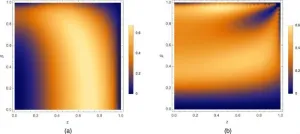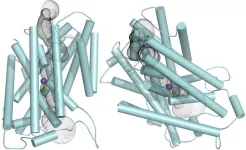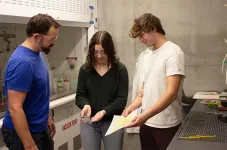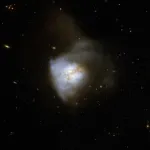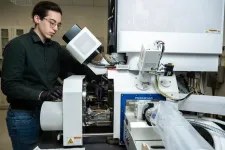(Press-News.org) A brotherly research duo has discovered that when the Large Hadron Collider (LHC) produces top quarks – the heaviest known fundamental particles – it regularly creates a property known as magic.
This finding, published in Physical Review D, has implications for the progression of quantum computing, with magic being a measure that describes how difficult a quantum system is for a non-quantum computer to calculate.
“The higher the magic, the more we need quantum computers to describe the behaviour,” explains Professor Martin White, from the University of Adelaide’s School of Physics, Chemistry and Earth Sciences, who co-led the study with his twin brother, Professor Chris White, a physicist from Queen Mary University of London.
“Studying the magic properties of quantum systems generates significant insights into the development and potential uses of quantum computers.”
The LHC is the world’s largest and most powerful particle accelerator, consisting of a 27-kilometre ring of superconducting magnets with a number of accelerating structures through which two high-energy particle beams travel at close to the speed of light before they are made to collide.
The amount of magic exhibited by top quarks depends on how fast they are moving and their direction of travel, all of which can be measured by the ATLAS and CMS detectors that observe the results of the LHC proton collisions.
“Quantum research has long focused on entanglement, which is where particles become linked; however, our work on magic explores how well-suited particles are for building powerful quantum computers,” says Professor White.
“The ATLAS experiment has already observed evidence of quantum entanglement. We have shown that the LHC can also observe more complex patterns of quantum behaviour at the highest energies yet attempted for these kinds of experiments.”
For decades, scientists have strived to build quantum computers that leverage the laws of quantum mechanics to achieve far greater processing power than traditional computers.
The potential benefits of quantum computers are vast, impacting fields like drug discovery and materials science. Harnessing this power requires robust and controllable quantum states, and magic plays a critical role in achieving that control.
"Our research paves the way for a deeper understanding of the connection between quantum information theory and high-energy physics,” says Professor White.
“This discovery is not just about the heaviest particles in the universe, it's about unlocking the potential of a revolutionary new computing paradigm.”
END
Large Hadron Collider regularly makes magic
2024-12-20
ELSE PRESS RELEASES FROM THIS DATE:
Functionality of a grapevine transport protein defined
2024-12-20
Researchers at the University of Adelaide have discovered that a protein which mediates the transport of alkali metal ions, such as potassium, and halides ions across plant membranes acts similarly to a protein found in animals.
The protein is a cation-chloride cotransporter (CCC), and these are present in all cellular life forms. Some CCCs are able to transport two types of ions, both potassium and halide chloride, while others can also transport a third – sodium.
The selectivity of plant CCCs has been controversial, and it was previously understood ...
Changes in store for atmospheric rivers
2024-12-20
Communities up and down the West Coast of the United States can expect the potent storms known as atmospheric rivers to evolve as the climate warms. But residents in Southern California will see much different changes than residents in more northerly locations like Seattle.
New research, led by scientists at the U.S. National Science Foundation National Center for Atmospheric Research (NSF NCAR), found that warming conditions will increase evaporation of ocean waters and significantly alter atmospheric rivers to the south. Farther north, however, atmospheric rivers will be most influenced by rising temperatures in the ocean and atmosphere.
While ...
First results from 2021 rocket launch shed light on aurora’s birth
2024-12-20
Newly published results from a 2021 experiment led by a University of Alaska Fairbanks scientist have begun to reveal the particle-level processes that create the type of auroras that dance rapidly across the sky.
The Kinetic-scale Energy and momentum Transport experiment — KiNET-X — lifted off from NASA’s Wallops Flight Facility in Virginia on May 16, 2021, in the final minutes of the final night of the nine-day launch window.
UAF professor Peter Delamere’s analysis of the experiment’s results was published Nov. 19 in Physics of Plasmas.
“The ...
Patience isn't a virtue; it's a coping mechanism
2024-12-20
Patience — like its corollary impatience — has always been a sort of “I know it when I see it” concept. And that didn’t sit well with UC Riverside psychology researcher Kate Sweeny.
“Philosophers and religious scholars call patience a virtue, yet most people claim to be impatient,” Sweeny said. “That made me wonder if maybe patience is less about being a good person and more about how we deal with day-to-day frustrations.”
For purposes of her research, Sweeny sought to better define what constitutes patience, and impatience, and the factors that determine them.
Impatience, ...
The Lancet Psychiatry: Autism spectrum disorder ranks among the top 10 causes of non-fatal health burden in youth
2024-12-20
A new global analysis reveals that an estimated 61.8 million people in 2021 were autistic —equivalent to 1 in every 127 individuals. Conducted as part of the Global Burden of Diseases, Injuries, and Risk Factors Study (GBD) 2021, the research identifies autism spectrum disorder (ASD) as one of the top ten causes of non-fatal health burden for youth under 20 years old.
Key findings reveal stark disparities: the global prevalence of ASD is significantly higher among males, at 1,065 cases per 100,000 males, almost double of global prevalence among females (508 per 100,000 females). Regions like High-Income ...
Innovative glue maker chosen for Japanese startup program
2024-12-20
The eco-friendly glue company D-Glue, co-created by a Cal Poly chemistry research team with student involvement in partnership with an East Coast company, has joined an international corporate incubator program as of Dec. 1.
Plug and Play, a global innovation platform that links startups, corporations, investors, universities and government agencies, has over 60 locations across the world, reaching across 25 industries. Plug and Play’s three-month international program matches startups with business investors among its 45 Japanese corporate ...
Digital labels can help grocers waste less food
2024-12-20
In 2022, U.S. grocers wasted 5 million tons of food, with 35% of it going to landfills, according to the food waste nonprofit ReFed. More than half of that waste — 2.7 million tons — was past the labels’ expiration dates.
But there’s a potential technological solution to the waste problem, according to new research from Texas McCombs. By moving from paper shelf labels to digital ones, supermarkets can easily lower prices and move older stock from their shelves to consumers’ homes.
Using technology to quickly change prices on labels, a process known as dynamic pricing, benefits more than just consumers, says Ioannis ...
Clever trick to cook stars like Christmas puds detected for first time
2024-12-20
Clever trick to cook stars like Christmas puds detected for first time
Royal Astronomical Society press release
RAS PR 24/33
Embargoed until 00:01 GMT on Friday 20 December 2024
The missing ingredient for cooking up stars in the same way you might steam your Christmas pudding has been spotted for the first time by astronomers.
Much like a pressure cooker has a weight on top of its lid to keep the pressure in and get your festive dessert dense, moist and ready to eat, merging galaxies may need magnetic fields to create the ideal conditions for star formation.
Until now, however, the existence of such a force had only been ...
By looking at individual atoms in tooth enamel, UW and PNNL researchers are learning what happens to our teeth as we age
2024-12-19
Teeth are essential for helping people break down the food they eat, and are protected by enamel, which helps them withstand the large amount of stress they experience as people chew away. Unlike other materials in the body, enamel has no way to repair damage, which means that as we age, it risks becoming weaker with time.
Researchers are interested in understanding how enamel changes with age so that they can start to develop methods that can keep teeth happier and healthier for longer.
A research team at the University of Washington and the ...
Volunteers should not become friends with patients
2024-12-19
When a volunteer supports a patient, a special and often rather unequal relationship can develop between the helper and the person receiving the help. Researchers have now investigated this relationship and offer guidance on finding the right balance.
When people get sick, they often depend on family or friends to help them out. In Norway, there are also public services that usually support people who need it.
“But public services or family and friends are not always enough. Volunteers and non-profit organizations are increasingly being used to provide care to the population,” says Associate Professor Gunhild Tøndel at ...
